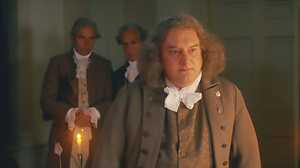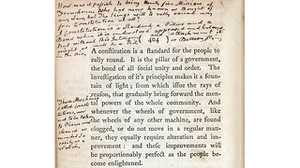The Presidency of John Adams

Inheritance
From the moment John Adams entered the presidency in 1797, the United States was in a state of undeclared war with France. The Quasi-War, as it was known, dominated his presidency, monopolizing both foreign policy and domestic policy. Adams inherited the crisis with France from Washington, as well as much of his cabinet. But the former vice president lacked the stature of his predecessor, and the cabinet's loyalties lay elsewhere -- primarily with former Treasury Secretary Alexander Hamilton, who was still the leader of the Federalist Party. Throughout Adams' administration, they would undermine his authority.
The Problem with France
The seeds of the Quasi-War were sown during Washington's second term, in 1793. With war raging between Britain and France, Washington proclaimed neutrality. He agreed to the Jay Treaty with Britain in 1795, which France perceived as a proclamation of hostility. It began to attack American ships that were trading with Britain. Adams, like Washington before him, knew the new nation could not withstand another war. But Adams was a Federalist, and in 1797, many in the Federalist Party were pro-war. For the Republican Party, headed by vice president Thomas Jefferson, friendly feelings toward France persisted from the successful French-American alliance during the Revolutionary War.
Renewed Nationalism
Perhaps it was natural that Adams, a former diplomat, would seek a peaceful resolution to the Quasi-War, but he also recognized that trade and security were in jeopardy. With envoys dispatched to Paris, Adams called for a military buildup in the event that the United States was forced to defend its neutrality. In 1798, the French foreign minister, Talleyrand, refused to meet with the Americans and audaciously demanded bribes for himself and the French government before diplomatic relations could resume. Adams refused. When details of the incident, known as the XYZ Affair, surfaced, a wave of nationalist hysteria swept the United States, Adams experienced an uncharacteristic level of popularity.
Infamous Acts
With the French refusing to negotiate, Adams' speeches took on a more militaristic tone. He began to appear in public in full military uniform; he was, after all, the commander in chief. Everything achieved during the Revolutionary War, he said, would be in grave danger if the country didn't go to war. "It would be cowardly not to take up arms." To the delight of the High Federalists, war preparations were under way. The Republican Party and press battered Adams for his stance. In 1798, with war hysteria peaking, the majority Federalist Congress pushed through the Alien and Sedition Acts, which put severe limits on civil liberties, including freedom of speech and press. Adams signed them into law and his administration vigorously enforced the Sedition Act against Republican writers and newspaper editors.
Courting Peace
In spite of his public pronouncements, Adams privately clung to the notion of a peaceful solution. His cabinet advised him to give up on the idea of sending another peace delegation to France; why court the humiliation of rejection a second time? But Adams believed that evidence existed that France wanted to end the crisis. He also knew that support for the war was waning. Taxation to cover military costs was not only unpopular, but reminiscent of British taxation the colonists had fought against 20 years before.
Fleeting Support
Adams decided to solve matters in the way he had previously been accustomed: independently. On February 18, 1799, he revealed to his cabinet and congress that he would send another envoy to France. He concealed the fact that John Quincy Adams, then minister to Prussia, had indicated that France was inching toward negotiations. By this time, many Federalists had forsaken their pro-war position, and Adams enjoyed a level of support within his own party. Unfortunately, people were weary of high taxes and the quashing of civil liberties, and the Republicans had grown more popular than ever.
Victory Too Late
In a case of stunningly bad timing, the election of 1800 came before news of Adams' successful diplomacy reached America. John Adams lost the election. Republicans Jefferson and Aaron Burr tied; the House of Representative would later break the tie in Jefferson's favor. Just days later, Adams got more devastating news: His second son, Charles, only 30 years old, had died of liver failure. Good news arrived soon after, but too late to save Adams' presidency: In October the Convention of 1800 had been signed between France and the United States. Peace had been achieved through diplomacy. The Quasi-War was over, but so was Adams' presidency.







